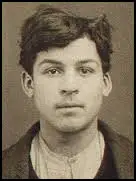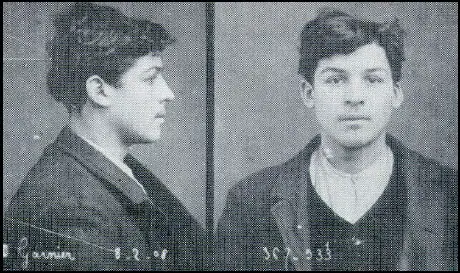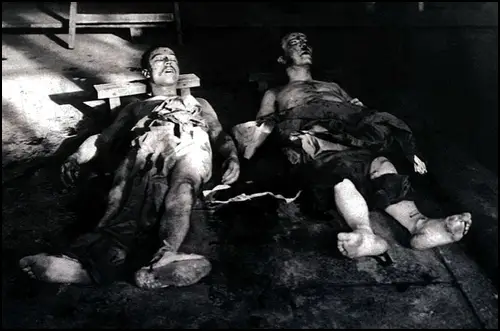Octave Garnier

Octave Garnier was born in Fontainebleau, Seine-et-Marne on 25th December 1889. He worked as a butcher but by the age of seventeen he was in prison for theft. While in prison he came into contact with radical political ideas and on his release he became involved with the syndicalist movement.
Garnier later commented: "Not wishing to be either exploited or an exploiter, I went stealing from shop displays, which didn't yield very much; at seventeen I was caught for the first time and sentenced to three months in prison. Through this I understood the meaning of justice: my companion, who had been charged with the same offence as me, as we were caught together, was only sentenced to two months, and that was suspended... When I got out of prison I went back to my parents, who reprimanded me with some violence. But having submitted to what is known as justice and prison had made me even more rebellious.... in a word, to become a being able to run my own affairs in every way, at the same time having the least possible dependence on others.... So I became an anarchist. I was about eighteen and no longer wanted to go back to work, so once more I turned to crime... but with no more luck than the first time. At the end of three or four months I was caught and sentenced to two months. I came out, and this time tried to work again. I took part in a strike, in the course of which there was a fight with the police, and I was arrested and sentenced to six days in prison. As I was in frequent contact with anarchists, I came to understand their theories, and became a fervent partisan of them, not because these theories gave me any particular pleasure, but because I found them to be the most fair and open to discussion."
His friend, Victor Serge, later wrote: "Garnier was a handsome, swarthy, silent lad whose dark eyes were astoundingly hard and feverish. Small, working-class by origin. Octave had suffered a vicious beating on a building site in the course of a strike.... No other man that I have met in my whole life has ever so convinced me of the importance and even the futility of the intellect when confronted with tough primitive creatures like this, rudely aroused to a form of intelligence that fits them purely technically for the life struggle."
In 1910 Garnier fled to Belgium in order to avoid being conscripted into the French Army. He returned to France where he associated with a group of anarchists that became known as the "illegalists" . Together they established their own ideology: "The anarchist is in a state of legitimate defence against society. Hardly is he born than the latter crushes him under a weight of laws, which are not of his doing, having been made before him, without him, against him. Capital imposes on him two attitudes: to be a slave or to be a rebel; and when, after reflection, he chooses rebellion, preferring to die proudly, facing the enemy, instead of dying slowly of tuberculosis, deprivation and poverty, do you dare to repudiate him? If the workers have, logically, the right to take back, even by force, the wealth that is stolen from them, and to defend, even by crime, the life that some want to tear away from them, then the isolated individual must have the same rights."

Garnier joined a gang led by Jules Bonnot. Other members included Raymond Callemin, André Soudy, Stephen Monier, René Valet and Edouard Carouy. Richard Parry, the author of the The Bonnot Gang (1987) has argued: "The so-called 'gang', however, had neither a name nor leaders, although it seems that Bonnot and Garnier played the principal motivating roles. They were not a close-knit criminal band in the classical style, but rather a union of egoists associated for a common purpose. Amongst comrades they were known as 'illegalists', which signified more than the simple fact that they carried out illegal acts. Illegal activity has always been part of the anarchist tradition, especially in France."
On 21st December, 1911 the gang robbed a messenger of the Société Générale Bank of 5,126 francs in broad daylight and then fled in a stolen Delaunay-Belleville car. It is claimed that they were the first to use an automobile to flee the scene of a crime. As Peter Sedgwick pointed out: "This was an astounding innovation when policemen were on foot or bicycle. Able to hide, thanks to the sympathies and traditional hospitality of other anarchists, they held off regiments of police, terrorized Paris, and grabbed headlines for half a year."
The gang then stole weapons from a gun shop in Paris. On 2nd January, 1912, they broke into the home of the wealthy Louis-Hippolyte Moreau and murdered both him and his maid. This time they stole property and money to the value of 30,000 francs. Bonnot and his men fled to Belgium, where they sold the stolen car. In an attempt to steal another they shot a Belgian policeman. On 27th February they shot two more police officers while stealing an expensive car from a garage in Place du Havre.
On 25th March, 1912, the gang stole a De Dion-Bouton car in the Sénart Forest by killing the driver. Later that day they killed two cashiers during an attack on the Société Générale Bank in Chantilly. Leading anarchists in the city were arrested. This included Victor Serge who complained in his autobiography, Memoirs of a Revolutionary (1951): "A positive wave of violence and despair began to grow. The outlaw anarchists shot at the police and blew out their own brains. Others, overpowered before they could fire the last bullet into their own heads, went off sneering to the guillotine.... I recognized, in the various newspaper reports, faces I had met or known; I saw the whole of the movement founded by Libertad dragged into the scum of society by a kind of madness; and nobody could do anything about it, least of all myself. The theoreticians, terrified, headed for cover. It was like a collective suicide."
The police offered a reward of 100,000 in an effort to capture members of the gang. This policy worked and on information provided by an anarchist writer, André Soudy was arrested at Berck-sur-Mer on 30th March. This was followed a few days later when Edouard Carouy was betrayed by the family hiding him. Raymond Callemin was captured on 7th April.
On 24th April, 1912, three policemen surprised Jules Bonnot in the apartment of a man known to buy stolen goods. He shot at the officers, killing Louis Jouin, the vice-chief of the French police, and wounding another officer before fleeing over the rooftops. Four days later he was discovered in a house in Choisy-le-Roi. It is claimed the building was surrounded by 500 armed police officers, soldiers and firemen. Bonnot was able to wound three officers before the house before the police used dynamite to demolish the front of the building. In the battle that followed Bonnot was shot ten times. He was moved to the Hotel-Dieu de Paris before dying the following morning.
Octave Garnier remained on the run with René Valet until 15th May, 1912. According to Victor Serge: "Octave Garnier and René Valet, caught up at Nogent-sur-Marne in a villa where they were hiding out with their women, underwent an even longer siege, taking on the civil police, the gendarmerie, and the Zouaves. They fired hundreds of bullets, viewing their attackers as murderers (and themselves as victims) and, when the house was dynamited, blew out their own brains."

Primary Sources
(1) Richard Parry, The Bonnot Gang (1987)
Horrified at the idea of joining the army, he left Paris in the middle of 1909, in the hope of delaying his call-up; he would be of military age on Christmas Day. It was not until May 1910, however, that Garnier began to work his way towards the frontier with Belgium - the traditional refuge of draft-dodgers, criminals and political refugees from France. His recruitment group was due to be called up at the end of September, for a period of two years as fixed by the law of 1905), but Garnier was intent on joining the ever-increasing ranks of' the seventy thousand draft-dodgers and deserters wanted by the French authorities, a number equivalent to two army corps. In the meantime, in July, Garnier was arrested for actual bodily harm. However, he was lucky enough to receive a sentence (two months) that would allow his release before his call-up papers arrived.
Out of prison once more, he worked for a few days as a navvy in order to get enough money to buy a ticket to the frontier. He only paid for part of the journey, as he needed the rest of his money for food. He was spotted by the Station Master sneaking out of the station at Valenciennes, but managed to talk him out of calling the police. He did another labouring job for a week before telling the boss to get stuffed, then did two burglaries and successfully crossed the frontier into Belgium. Around the 6th October he arrived in Charleroi, found some work, and met up with the local anarchists.
(2) Victor Serge, Memoirs of a Revolutionary (1951)
Garnier was a handsome, swarthy, silent lad whose dark eyes were astoundingly hard and feverish. Small, working-class by origin. Octave had suffered a vicious beating on a building site in the course of a strike.... No other man that I have met in my whole life has ever so convinced me of the importance and even the futility of the intellect when confronted with tough primitive creatures like this, rudely aroused to a form of intelligence that fits them purely technically for the life struggle.
(3) Octave Garnier, statement that appeared in The Bonnot Gang (1987)
Not wishing to be either exploited nor an exploiter, I went stealing from shop displays, which didn't yield very much; at seventeen I was caught for the first time and sentenced to three months in prison. Through this I understood the meaning of justice: my companion, who had been charged with the same offence as me, as we were caught together, was only sentenced to two months, and that was suspended...
When I got out of prison I went back to mv parents, who reprimanded me with some violence. But having submitted to what is known as justice and prison had made me even more rebellious....in a word, to become a being able to run my own affairs in every way, at the same time having the least possible dependence on others....
So I became an anarchist. I was about eighteen and no longer wanted to go back to work, so once more I turned to crime... but with no more luck than the first time. At the end of three or four months I was caught and sentenced to two months. I came out, and this time tried to work again. I took part in a strike, in the course of which there was a fight with the police, and I was arrested and sentenced to six days in prison.
As I was in frequent contact with anarchists, I came to understand their theories, and became a fervent partisan of them, not because these theories gave me any particular pleasure, but because I found them to be the most fair and open to discussion.
Within this milieu, I met individuals of integrity who were trying as much as possible to rid themselves of the prejudices which have made this world ignorant and barbaric. They were men with whom I found discussion a pleasure, for they showed me not utopias but things which one could see and touch. Moreover, these individuals were quite sober. When I discussed with them, I didn't need, as was the case amongst the great mass of barbarians, to turn my head away as they chatted to me. for their mouths didn't reek of alcohol or tobacco. I found them to be fair, and encountered amongst them great energy and strength of view.
My views were soon set, I became one of them. No longer did I want to go and work for someone else, I wanted to work for myself, although as to how, I didn't have much choice. But, having acquired some experience, and full of energy, I resolved to defend myself to the death against the stupid mass and the iniquity of present Society.
